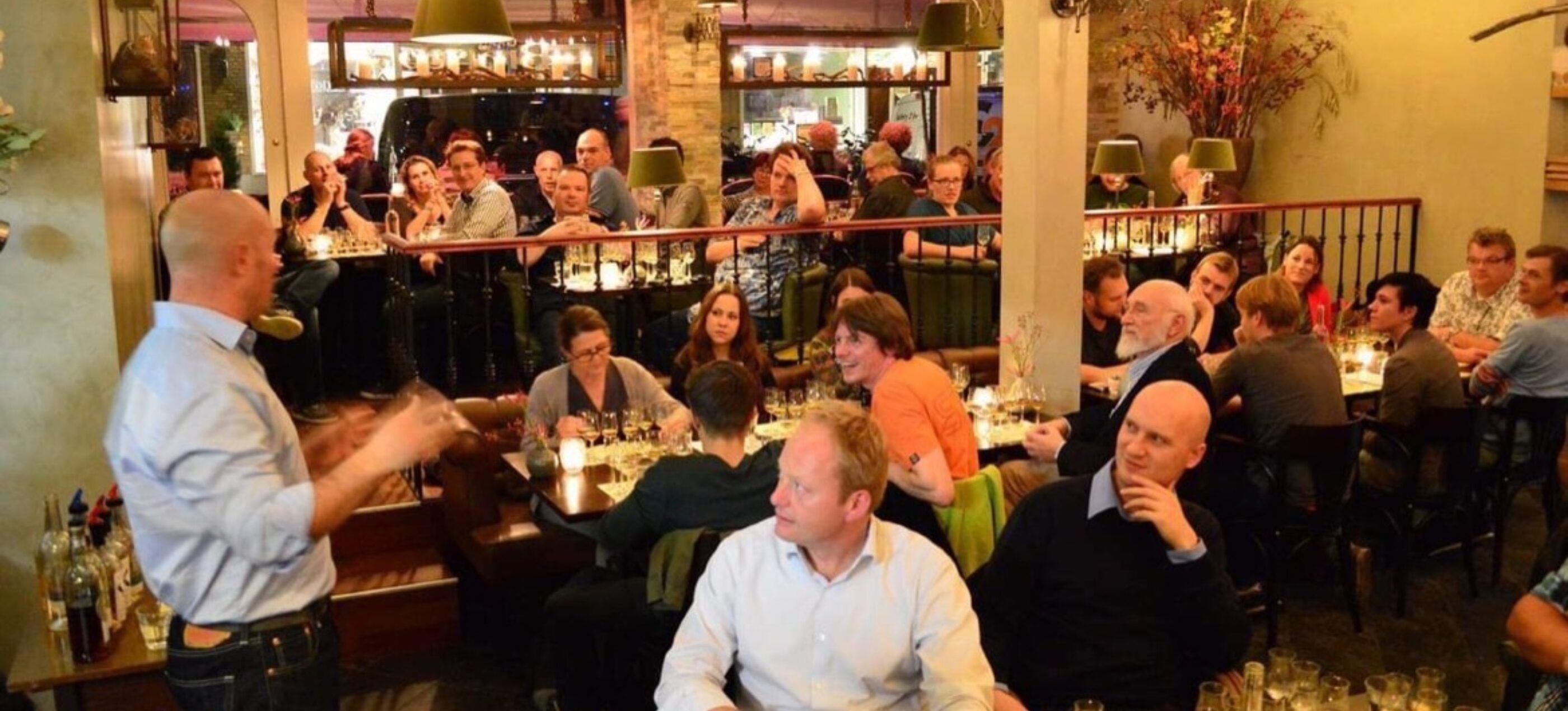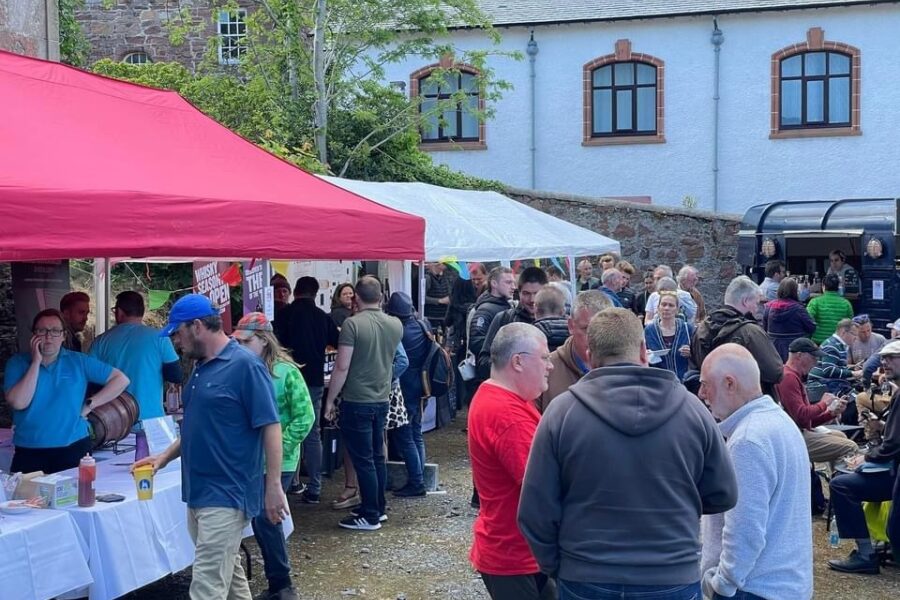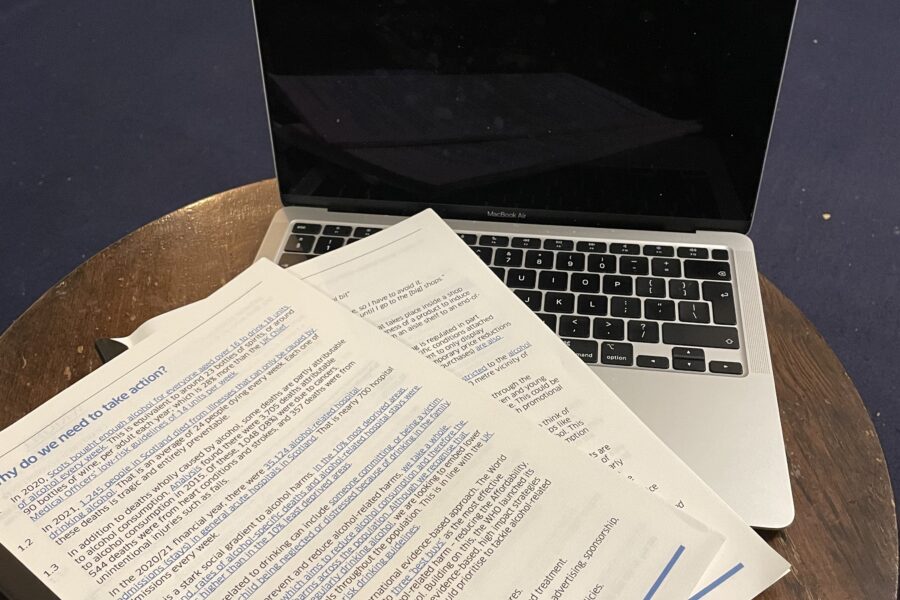Whisky tastings – a Rough Guide, by David Stirk
There are often six whiskies in front of you. Or a tasting sheet promising six whiskies – sometimes more, not usually less. Rarely will any of the attendees have tasted all the whiskies being poured and whilst the style and story can alter from speaker to speaker the message is often a well trampled field of quips, gags, historical pieces and disclosures. Looking about the room, as all will do at some point in the evening, the mix of paying public will vary from those that are hardened regulars to the more green, less soaked-in-the-set-up, and eager to taste and learn.
Chances are everyone knows not only who the speaker is but what the whiskies are being poured prior to attending. The former or the latter, or both, may have been the draw for money to exchange hands and here we are:- anything from 20 to 60-odd thirsty and keen punters out for a good time. Well, most of the time that is the case – personal experiences and habits may vary. It is not a unique set-up to the whisky industry but in many ways the ‘Whisky Tasting’ is a unique environment. Certainly in my 25 plus years of attending ‘drinks’ tastings/demonstrations (call them what you will) the whisky tasting is in a class of its own. I know of no other industry that will allow people, as soon as they enter the business, to host an evening with paying guests, and, then leave at the end of the evening having not been taken to task over their lack of knowledge.
My first tasting was one such occasion. Having only been into whisky for a few years I was hosting a small in-shop tasting at the Speyside Whisky Festival. Every attendee had been drinking whisky for longer than me and several were better read. I fumbled over words, forgot people’s names, got lost in my own notes and barely covered a third of what I wanted to. Nobody complained though. Nobody walked out or asked for their money back. As each presenter will learn, finding your own style and voice is the most important aspect of hosting a tasting.
When I started in the industry there were very (very) few ‘Brand Ambassadors’ hosting the sparse tastings that existed. Richard Paterson and Jim McEwan had already both built up a considerable reputation as showmen; engaging and interesting. Richard enjoyed wowing people with antics (his carpet cleaning bills being part of his story), recalling historical dates and occurrences with ease and of course his long ‘family’ history and career allowing for a very full narrative to an evening. Jim was a captivating speaker whose ability to spin a yarn and make everyone feel part of the team or group on the night, I would argue, is second to none. But really those two apart there were few travelling the world as the whisky festival and demand for whisky evenings had yet to really take off.
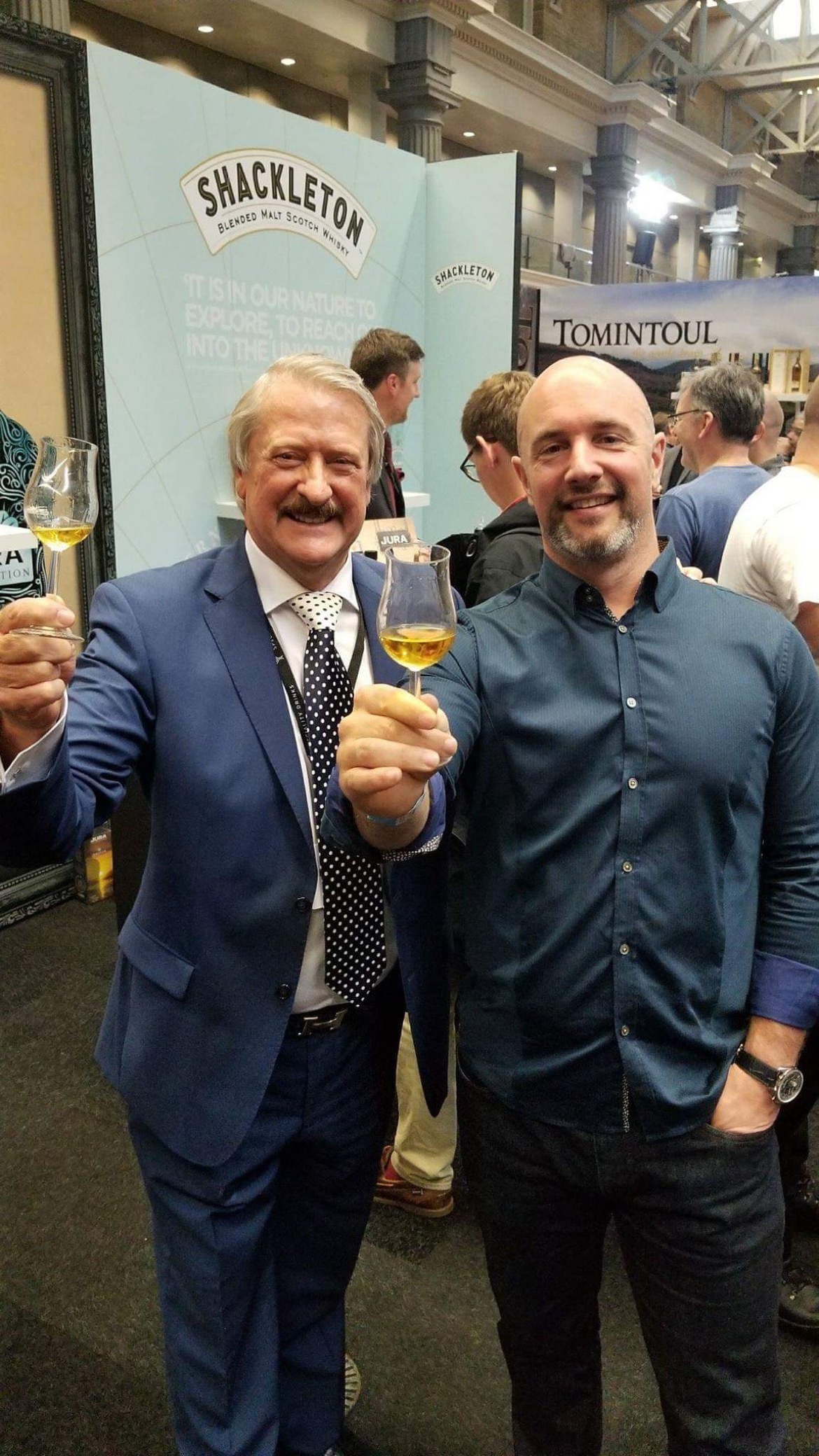
Hosting a tasting was, really, just an added part of being a whisky salesman. It would often be added on at the end of an interview: “Oh, and of course you won’t mind standing in front of groups of people talking about the whisky?” In the last 20 years things have changed and the sales part of the job can often seem secondary to the work or skill or ability to host a tasting – and at this point I should add, Great! – after all, no-one likes a salesperson do they? But someone that can hold an audience whilst discussing a product – we like them, a lot. (Yes, I'm well aware I have just described a 'salesperson'.)
I’ve been to some great tastings – some because of the whisky (G&M hosted one in London that was all of their oldest Mortlachs. Just amazing), some because of the speaker and some because of the audience. I’ve also been to some howlers for exactly the same reasons. One, and this was over 20 years ago, was ruined by the organiser that cut all of the (old) whiskies to 20% prior to pouring. One where the host decided he would insult one of the patrons and one in particular where the host took roughly 80% of the two hours to talk about their company whilst all attending watched their whiskies evaporate into whichever angels happened to be hovering around at that point.
Let’s not dwell on the negatives, rather let’s look at and discuss what a whisky tasting is with a caveat; I am not an expert at hosing tastings. I have got as many wrong as I have got right (probably) and as I have already mentioned, everyone needs to find their own voice. This is more an in-depth look at what can and maybe should occur; how the host can behave and how the audience can help (and likely get more enjoyment out of the evening).
Firstly, and really this is the most important point I can make, it should be fun. I recall a magazine tasting that Dave Broom and I once attended. It was one of those ‘What is the greatest whisky in the world’ type tastings – despite the fact there were only about 30 whiskies on offer and many were supermarket blends. (And surprise, surprise the winner was indeed a supermarket blend allowing attention-seeking headlines in rags to read "Sainsbury whisky crowned greatest in the world' etc.) The attendees, other than Dave and myself, were all wine writers (a few Port importers too) and it was not fun in the least (‘this is serious business don’t you know’). One of those present was circulating a whisky, Laphroaig, around their mouth in the way wine writers do as they prepare to spit (think Hannibal in ‘Silence of the Lambs’ – a nice Chianti…). Unfortunately they caught a good glug of the whisky in their windpipe and Dave and I watched, transfixed, as their complexion went from porcelain doll to first day tourist in Gran Canaria (sans sunscreen). We’ve all likely done it and it isn’t really amusing, but what made it funny was this was a serious tasting and this person was trying to keep their composure as the whisky slowly burned its way through a lung. Had they been swallowing their whisky, like Dave and I, this agony could have been averted. Too serious.
So, please, for the love of all things right and good, a whisky tasting should be fun. Just like all gambling ads in the UK are beholden to add – ‘when the fun stops, stop.” If you’re not having fun whilst drinking whisky, why are you drinking whisky? Fun means not taking your message too seriously. Not taking yourself too seriously and definitely allowing involvement from those along with you on the ride.
Fun is also helped by not having any preconditions to attendance. We’ve all heard the stories, possibly apocryphal, of hosts demanding attendees not wear aftershave or perfume, or that the venue be in an air-conditioned building etc. These prima donna requirements are just going to get people on edge before they attend.
Don’t take yourself seriously. No, seriously, don’t. Remember, the faces in front of you have taken time out of their lives, using disposable income that is very precious and hard won, to come and spend an evening with you. If at some point you realise that your fly/zipper is down, make a joke about it. Likewise if the hastily-eaten meal before the tasting is still evident on your shirt – either ignore it or laugh it off. Granted, not everyone can do this easily, so if you are uncomfortable about laughing things off then ignore it. I guarantee that it is a bigger deal to you than the audience. If somebody from the audience points it out – thank them. Avoid being defensive at all times. Remember: FUN.
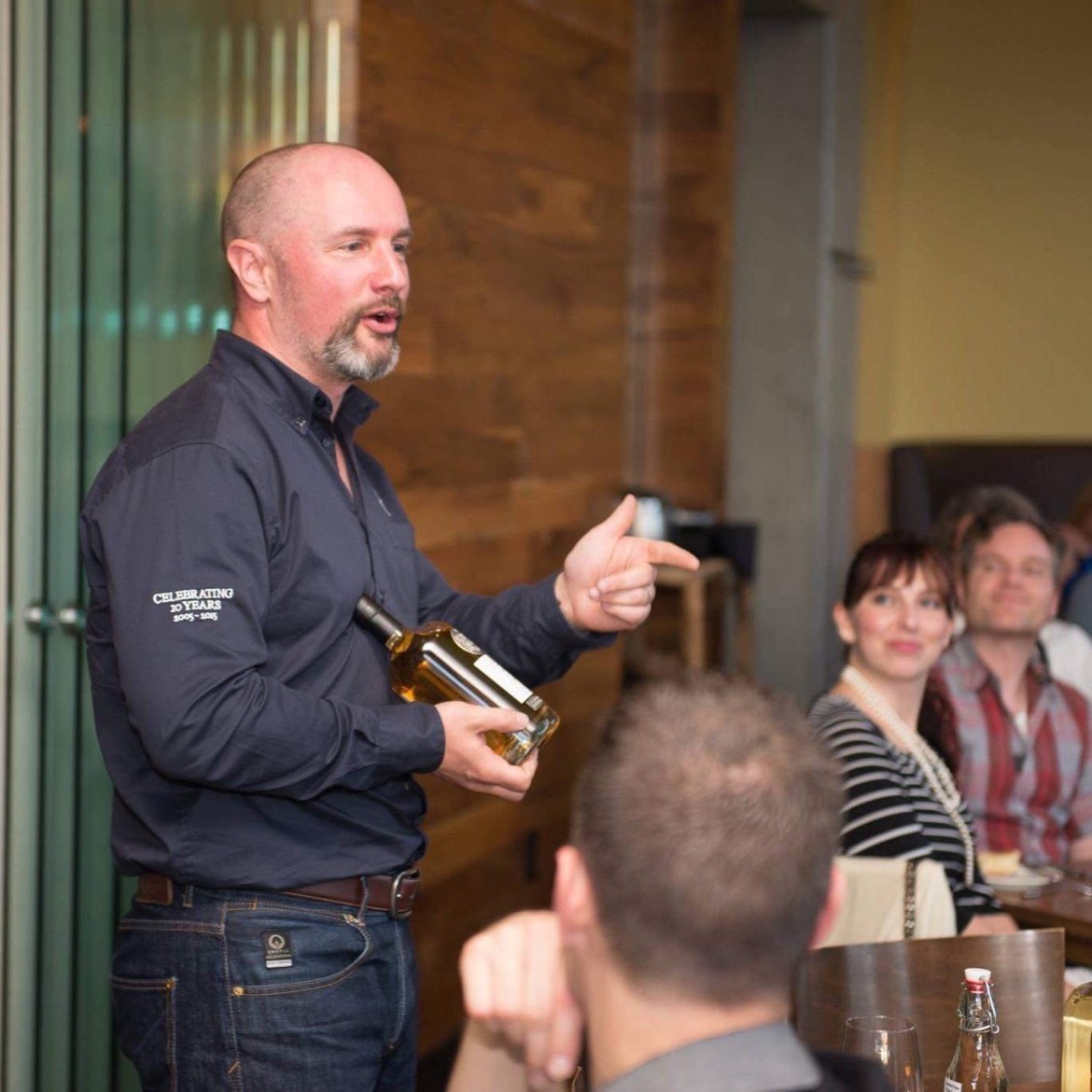
One easy way to ensure a tasting remains fun is to allow and encourage engagement and involvement with/from the audience. Again, just like making jokes out of situations, some are better at this than others but I believe a tasting is always better with at least some periods of the presenter shutting up and allowing the audience chat amongst themselves. Unless you really believe you can fill two hours or so with engaging and stimulating information & stories, you are going to strip some of the fun out of the evening. Get better at regaining people’s attention when it is time to move onto the next whisky (the clinking glass works well – just be careful with those thin wine glasses: easily broken).
This neatly brings me onto a delicate but pressing matter: The resident expert. We’ve all likely come across one and they exist in most sectors (and I’m going to go out on a limb here and suggest that they are almost always men – sorry, but it’s true). The resident expert has tasted more whiskies than anyone else in attendance, knows more production facts than you, knows more dates of closures, openings, bottle codes and auction values etc. They often word their questions in the form of a statement; often have the most questions, the most queries and will most definitely be that one person in the room to call you out on something you got wrong. Important to stress they are not all a negative drain on the fun of the evening – some can be extremely helpful when that date or fact eludes you (and this is an excellent way of making them part of the evening but without killing the joy for everyone).
To avoid any embarrassment I will withhold names but I was at an incredibly prestigious tasting in London where a (man) decided he would finish some of the sentences of the very well-known host. This became irksome for all attending until the host eventually stopped mid-sentence and introduced the gentleman as the new host for the tasting – at which point the ‘know-it-all’ shut up, everyone cheered and a good time was then had. Sometimes you just have to deal with it.
And if you’re reading this and thinking ‘well, I’m so glad that I’ve never been to a whisky tasting with someone like that’ – maybe just make sure that ‘someone’ isn’t you (and yes, I'm speaking from experience)
The real beauty and appeal of whisky and tastings is that there is no right or wrong – or at least there shouldn’t be. I recall a tasting in the late ‘90s where someone proffered that they could smell nutmeg to which the host replied ‘No, there’s definitely no nutmeg in this’. Wrong! Whatever you smell or taste is what You get out of the whisky. And if you don’t like it that is absolutely fine. As the host, please don’t try and argue with someone when they suggest they don’t like a whisky. Take it on the chin. As much as your job is to encourage a fun evening it is also to allow a dialogue about the whisky – regardless of whether it is positive or negative. On one occasion I witnessed someone suggesting that they did not like a whisky due to something about it. The host was not having it and tried to turn the audience against the individual. Not a clever move. Not very ‘relaxed’ some might say. (If you're not familiar with this reference you need to visit Maltstock) Never take it personally.
Plan the evening. Sounds a simple piece of advice but actually this goes for both the host and the attendee. I’m going to keep retelling my own stories as reference (only way I can write this to be fair) but one tasting was rather ruined as was held in a restaurant. To cut a long story short the restaurant had an open kitchen and one group ordered the most incredibly pungent dish on the menu. It was nigh on impossible to taste the whiskies after this. It was still a fun evening but very hard to get people to offer their opinion when everything was coming back as just smelling like grilled fish.
If you’re hosting the event then plan the whiskies as best you can. I realise this sounds elementary but on so many occasions it has been overlooked. Is there a glass for each whisky? If not is there enough water to wash out between drams? Is there a break for food? Are there peaty whiskies to consider in the line-up? Two things that I think can seriously help an evening: firstly take a break half way through the evening. If you’ve got more than one peaty/smoky whisky then perhaps break them up into each session. Secondly, don’t start with the strongest whisky. Now I don’t mean strong as in alcohol – I mean flavour. On one occasion I feel a great tasting was ruined by starting with the distillery’s ‘new-make’. This potent spirit clung onto the palate throughout the rest of the drams (in fact for this tasting we finished with the 30yo and we would have been better served by starting with it and working backwards).
A few more pointers that, in my experience, aid a better tasting:
- Make yourself heard. If you have time get someone to sit at the back of the room and make sure they can hear you. Also speak slowly and clearly.
- Avoid giving out easily got information. Facts, figures, production methods that can be obtained by a very simple internet search should be avoided. New information and when used as part of a point or uniqueness – fire away.
- Leave the competition alone. You’re there to convince the crowd on your product. It’s a wonderfully small industry…
- Make it personal. Don’t read company literature, never read the notes off the bottle (unless you wrote them) – instead talk about why you love the whisky.
- Never take it personally. As I mentioned before, if someone doesn’t like a whisky – fine. Don’t get defensive or offended.
- Don’t get caught in the trap of telling the same jokes over and over. You’ll just have to trust me on this one…
- Thank everyone for coming. Sounds simple but remember they are there for you, not the other way around.
And a few points if you are attending a tasting:
- Don’t wear any aftershave or perfume. Ha! I’m just kidding.
- Plan for the evening. Maybe avoid any food that might disagree with tasting six (or more) whiskies?
- When the host clinks the glass or calls for attention just remember, if they are a good host it won’t be too long before you can finish that story you were telling.
- It is important to remember that this rep may have been away from home for weeks. Maybe to several different markets/countries. They may be extremely fatigued and desperate to get home. They may be away from family, young children, sick pets – all sorts. Getting dates wrong, looking faded or not wanting to go out for a beer afterwards is not meant to reflect on you or the evening.
- You don’t have to like all of the whiskies. They are like children – you’ll always love some more than others.
- If you’ve had a good time – let them know. It really means a lot.
- Have fun.
This is of course quite a vague guide but then it should be. Everyone will find different their own voice and preferences and every evening ‘should’ be different. The more personal you can make the tasting the better.
Many thanks to our guest writer David for providing this piece. Wee disclaimer - all opinions are his, not necessarily ours! Seriously though, if you enjoy David's writing style and stories you should keep an eye out for his new book, 'Independent Scotch - The History of Independent Bottlers' which is due to be published in the next few months. Drop him and email if you want to pre order a copy. Cheers - Kate & Mark

